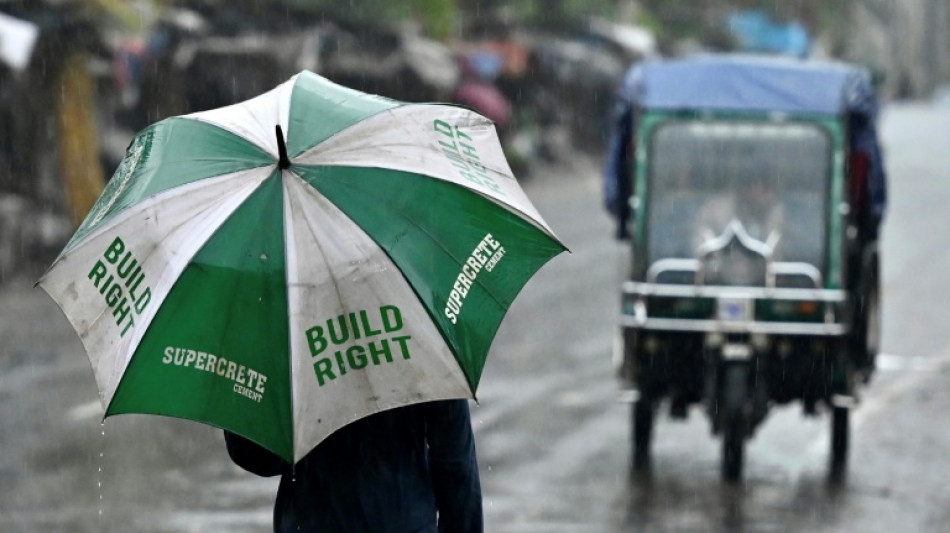
-
 Roche says will invest $50 bn in US over next five years
Roche says will invest $50 bn in US over next five years
-
Fleeing Pakistan, Afghans rebuild from nothing
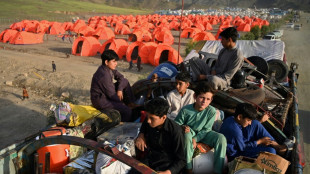
-
 US Supreme Court to hear case against LGBTQ books in schools
US Supreme Court to hear case against LGBTQ books in schools
-
Pistons snap NBA playoff skid, vintage Leonard leads Clippers

-
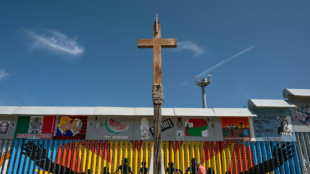 Migrants mourn pope who fought for their rights
Migrants mourn pope who fought for their rights
-
Duplantis kicks off Diamond League amid Johnson-led changing landscape

-
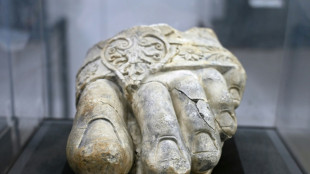 Taliban change tune towards Afghan heritage sites
Taliban change tune towards Afghan heritage sites
-
Kosovo's 'hidden Catholics' baptised as Pope Francis mourned

-
 Global warming is a security threat and armies must adapt: experts
Global warming is a security threat and armies must adapt: experts
-
Can Europe's richest family turn Paris into a city of football rivals?

-
 Climate campaigners praise a cool pope
Climate campaigners praise a cool pope
-
As world mourns, cardinals prepare pope's funeral
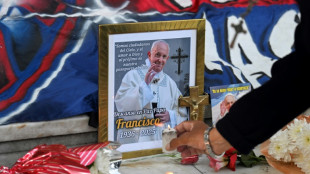
-
 US to impose new duties on solar imports from Southeast Asia
US to impose new duties on solar imports from Southeast Asia
-
Draft NZ law seeks 'biological' definition of man, woman

-
 Auto Shanghai to showcase electric competition at sector's new frontier
Auto Shanghai to showcase electric competition at sector's new frontier
-
Tentative tree planting 'decades overdue' in sweltering Athens

-
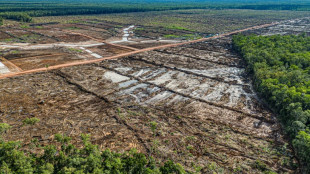 Indonesia food plan risks 'world's largest' deforestation
Indonesia food plan risks 'world's largest' deforestation
-
Gold hits record, stocks slip as Trump fuels Fed fears

-
 Trump helps enflame anti-LGBTQ feeling from Hungary to Romania
Trump helps enflame anti-LGBTQ feeling from Hungary to Romania
-
Woe is the pinata, a casualty of Trump trade war

-
 'Like orphans': Argentina mourns loss of papal son
'Like orphans': Argentina mourns loss of papal son
-
Trump tariffs torch chances of meeting with China's Xi

-
 X rival Bluesky adds blue checks for trusted accounts
X rival Bluesky adds blue checks for trusted accounts
-
China to launch new crewed mission into space this week

-
 Morocco volunteers on Sahara clean-up mission
Morocco volunteers on Sahara clean-up mission
-
Latin America fondly farewells its first pontiff

-
 'I wanted it to work': Ukrainians disappointed by Easter truce
'I wanted it to work': Ukrainians disappointed by Easter truce
-
Harvard sues Trump over US federal funding cuts

-
 'One isn't born a saint': School nuns remember Pope Francis as a boy
'One isn't born a saint': School nuns remember Pope Francis as a boy
-
Battling Forest see off Spurs to boost Champions League hopes

-
 'I don't miss tennis' says Nadal
'I don't miss tennis' says Nadal
-
Biles 'not so sure' about competing at Los Angeles Olympics

-
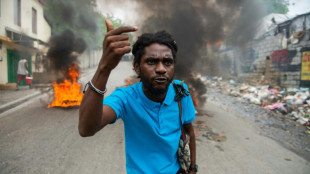 Gang-ravaged Haiti nearing 'point of no return', UN warns
Gang-ravaged Haiti nearing 'point of no return', UN warns
-
US assets slump again as Trump sharpens attack on Fed chief

-
 Forest see off Spurs to boost Champions League hopes
Forest see off Spurs to boost Champions League hopes
-
Trump says Pope Francis 'loved the world,' will attend funeral

-
 Oscar voters required to view all films before casting ballots
Oscar voters required to view all films before casting ballots
-
Bucks' Lillard upgraded to 'questionable' for game 2 v Pacers

-
 Duplantis and Biles win Laureus World Sports Awards
Duplantis and Biles win Laureus World Sports Awards
-
US urges curb of Google's search dominance as AI looms

-
 The Pope with 'two left feet' who loved the 'beautiful game'
The Pope with 'two left feet' who loved the 'beautiful game'
-
With Pope Francis death, Trump loses top moral critic

-
 Mourning Americans contrast Trump approach to late Pope Francis
Mourning Americans contrast Trump approach to late Pope Francis
-
Leeds and Burnley promoted to Premier League

-
 Racist gunman jailed for life over US supermarket massacre
Racist gunman jailed for life over US supermarket massacre
-
Trump backs Pentagon chief despite new Signal chat scandal

-
 Macron vows to step up reconstruction in cyclone-hit Mayotte
Macron vows to step up reconstruction in cyclone-hit Mayotte
-
Gill, Sudharsan help toppers Gujarat boss Kolkata in IPL

-
 Messi, San Lorenzo bid farewell to football fan Pope Francis
Messi, San Lorenzo bid farewell to football fan Pope Francis
-
Leeds on brink of Premier League promotion after smashing Stoke


16 dead, million seek shelter as cyclone hits Bangladesh
At least 16 people died after a cyclone slammed into Bangladesh, forcing the evacuation of about a million people from their homes, officials said Tuesday.
Around 10 million people were without power in 15 coastal districts, while schools were shut across southern and southwestern regions.
Cyclones -- the equivalent of hurricanes in the Atlantic or typhoons in the Pacific -- are a regular menace but scientists say climate change is likely making them more intense and frequent.
Cyclone Sitrang made landfall in southern Bangladesh late Monday but authorities managed to get about a million people to safety before the monster weather system hit.
Jebun Nahar, a government official, said 14 people died, mostly after they were hit by falling trees, and two died after a boat sank in squally weather in the Jamuna river in the north.
"We still have not got all the reports of damages," she told AFP.
People evacuated from low-lying regions such as remote islands and river banks were moved to thousands of multi-storey cyclone shelters, Disaster Management Ministry secretary Kamrul Ahsan told AFP.
"They spent the night in cyclone shelters. And this morning many are heading back to their homes," he said.
In some cases police had to cajole villagers who were reluctant to abandon their homes, officials said.
Trees were uprooted as far away as the capital Dhaka, hundreds of kilometres (miles) from the epicentre of the storm.
Heavy rains lashed much of the country, flooding cities such as Dhaka, Khulna and Barisal -- which witnessed 324 millimetres (13 inches) of rainfall on Monday.
About 33,000 Rohingya refugees from Myanmar, controversially relocated from the mainland to a storm-prone island in the Bay of Bengal, were ordered to stay indoors and there were no reports of any casualties or damage, officials said.
A feared major storm surge did not materialise, however.
- Panic and snakes -
On the southern island of Maheshkhali, the cyclone uprooted many trees and created panic after power and telecoms were cut.
"Such was the power of the wind we could not sleep in the night because of the fear that our homes will be destroyed. Snakes entered many homes. Water also inundated many homes," said Tahmidul Islam, 25, a resident of Maheshkhali.
In the worst-affected Barisal region, teeming rains and heavy winds wreaked havoc for vegetable farms, Aminul Ahsan, regional district administrator, told AFP.
In the neighbouring eastern Indian state of West Bengal, thousands of people were evacuated Monday to more than 100 relief centres, officials said, but there were no reports of damage and people were returning home on Tuesday.
Last year, more than a million people were evacuated along India's east coast before Cyclone Yaas battered the area with winds gusting up to 155 kilometres (96 miles) an hour -- equivalent to a Category 2 hurricane.
Cyclone Amphan, the second "super cyclone" ever recorded over the Bay of Bengal, which hit in 2020, killed more than 100 people in Bangladesh and India, and affected millions.
In recent years, better forecasting and more effective evacuation planning have dramatically reduced the death toll from such storms. The worst recorded, in 1970, killed hundreds of thousands of people.
S.Keller--BTB


